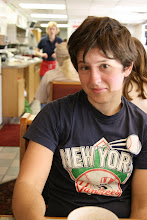 I read Maurice Halbwachs On Collective Memory that seemed to iterate 1) no memory is truly real and 2) memory is oriented by our connection to society. Parts of this make sense-- if we feel alien in a place than we remember our occupation of previous ones familiarly, etc. But I was thrown by the articles repeated use of the terminology "disconnection" to talk about the difference between the memories of waking space and dreams-- "In a way, contemplative memory or dreamlike memory helps us to escape society. It is one of the rare moments when we succeed in isolating ourselves completely." I recently started subletting a room after 2 months of being without my own and it was strange and wonderful to sleep in a large bed by myself. Of course, when I'm sleeping, even next to another person, I am completely alone in those dreams. But some part of me questions whether that is really true-- whether sleep affords a real disconnection from the body next to me... I'm not sure. It seems like a more umbilical relationship than that.
I read Maurice Halbwachs On Collective Memory that seemed to iterate 1) no memory is truly real and 2) memory is oriented by our connection to society. Parts of this make sense-- if we feel alien in a place than we remember our occupation of previous ones familiarly, etc. But I was thrown by the articles repeated use of the terminology "disconnection" to talk about the difference between the memories of waking space and dreams-- "In a way, contemplative memory or dreamlike memory helps us to escape society. It is one of the rare moments when we succeed in isolating ourselves completely." I recently started subletting a room after 2 months of being without my own and it was strange and wonderful to sleep in a large bed by myself. Of course, when I'm sleeping, even next to another person, I am completely alone in those dreams. But some part of me questions whether that is really true-- whether sleep affords a real disconnection from the body next to me... I'm not sure. It seems like a more umbilical relationship than that.And I wondered about this disconnection-- how it was both essential to the inward emotional meanderings of memory and how it also destroys our ability to understand memory cognitively through societal cues and historical facts. The disconnection seems to be the place where things open up and get exciting/confusing. The article also threw out some of other words of interest-- "yearning" "identity" "nostalgia", before wrapping up with the following: "Society from time to time obligates people not just to reproduce in through previous events of their lives, but also to touch them up, to shorten them, or to complete them so that, however convinced we are that our memories are exact, we give them a prestige that reality did not possess."

No comments:
Post a Comment